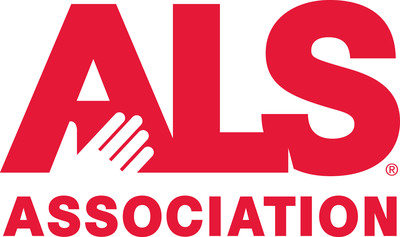WASHINGTON, April 16, 2015 /PRNewswire-USNewswire/ -- The ALS Association, Harvard Stem Cell Institute, and Massachusetts General Hospital Neurological Clinical Research Institute today announced they are collaborating with GlaxoSmithKline (GSK) on a clinical trial to evaluate the potential of an anti-epileptic drug in ALS patients. In parallel testing, brain cells will be made from each patient's stem cells to see if they can predict which patients might respond to the medicine.

The trial will evaluate the potential of the drug, Retigabine, which has a unique mechanism of action and can calm the excitability of nerve cells that are thought to cause seizures. These "hyperexcitable neurons" are also thought to play a role in ALS. Alongside testing of the medicine, scientists will for the first time create stem cells from these patients to see if they can be used to determine in advance which patients could benefit from the medicine.
The study is being led by Brian Wainger, M.D., Ph.D., of the department of Neurology at Massachusetts General Hospital, in collaboration with Merit Cudkowicz, M.D., Chief of Neurology at MGH. It will be performed at 12 academic sites within the Northeast ALS Consortium, an international, independent, non-profit group of researchers who collaboratively conduct clinical research in ALS and other motor neuron diseases. GSK will provide the drug, and funding support will come from HSCI, The ALS Association, the MGH NCRI and GSK.
"This novel study will provide us with a better understanding of neuron hyperexcitability, a potentially important disease mechanism in ALS patients," said Lucie Bruijn, Ph.D. MBA, Chief Scientist for The ALS Association. "This powerful collaboration of leaders in the fields of stem cells, clinical neurology, ALS research and GSK will be the first time that lab data from patient derived stem cells with disease-specific properties that respond to drugs have formed the basis for a clinical trial. It is our hope that this novel approach demonstrates promising results and leads to better clinical trials for ALS patients in the future."
ALS and Hyperexcitability
Amyotrophic lateral sclerosis, or ALS, is a progressive neurodegenerative disease that affects nerve cells (neurons) in the brain and the spinal cord. Eventually, people with ALS lose the ability to initiate and control muscle movement, which often leads to total paralysis and death within two to five years of diagnosis. There is no cure, and there are no life-prolonging treatments for the disease.
A large body of data supports the hypothesis that neurons become hyperexcitable in ALS, firing more than they normally do. Such overactivity may contribute to the death of the nerve cells, considered a root cause of the disease. In cell models of ALS, Retigabine has shown the ability to reduce excitability and prolong survival in the lab.
Pre-clinical work leading up to this study was performed at Boston Children's Hospital and Harvard University. Stem cell modeling development was supported by Project ALS and NINDS with identification of Retigabine as a target supported by Target ALS, ALS Association, Harvard NeuroDiscovery Center, American Brain Foundation and NINDS.
In this collaborative study, researchers will test whether Retigabine can reduce excitability of upper and lower motor neurons. The study will include non-invasive measurements of nerve cells and nerve function as biomarkers of the effect of the drug. In addition, blood cells from treated subjects will be isolated and studied using stem cell technology to uncover cellular determinants of drug response. This is the first time that this technology has been applied in a clinical trial and could open up new possibilities for drug research and development.
About The ALS Association
The ALS Association is the only national non-profit organization fighting Lou Gehrig 's Disease on every front. By leading the way in global research, providing assistance for people with ALS through a nationwide network of chapters, coordinating multidisciplinary care through certified clinical care centers, and fostering government partnerships, The Association builds hope and enhances quality of life while aggressively searching for new treatments and a cure. For more information about The ALS Association, visit our website at www.alsa.org.
About the Harvard Stem Cell Institute
As the largest collaborative of its kind, the Harvard Stem Cell Institute is a unique scientific enterprise -- a community of scientists and clinical experts in stem cell science seeking to bring new treatments to the clinic and new life to patients with a wide range of chronic illnesses. The Harvard community consists of the largest concentration of biomedical researchers in the world, which allows us to advance stem cell biology and translational medicine. Stem cell biologists across all the departments, schools, institutes, and affiliated hospitals of Harvard are able to collaborate on a daily basis with scientist-physicians, chemists, bioengineers, experts in business, law, and ethics, in order to develop tomorrow's treatments and cures today.
The Neurological Clinical Research Institute (NCRI)
The mission of the Neurological Clinical Research Institute is to accelerate translational research in neurological disorders through initiating and testing novel therapies. The NCRI develops, designs, supports and manages innovative observational and interventional trials for common and rare neurological disorders. The NCRI is also the Clinical Coordination Center for the NINDS supported NeuroNEXT phase II trial network. The NCRI similarly serves as a Coordinating Center for the Northeast ALS Consortium (NEALS).
Northeast ALS Consortium (NEALS) www.alsconsortium.org
The Northeast ALS Consortium (NEALS) is a non-profit, research consortium committed to the cooperative implementation, timely completion, analysis, and reporting of clinical trials and other research studies aimed at improving patient care and understanding of the disease process of Amyotrophic Lateral Sclerosis (ALS) and motor neuron disease. Formed with the goal of bringing together leading ALS scientists and clinicians, today there are 116 membership sites and more than 500 members around the world. The NEALS Consortium has led multiple clinical trials in ALS and hosts a biosample repository and clinical data repository for ALS research. Since its inception, NEALS has trained over 160 site and principal investigators; the consortium also annually teams with The ALS Association for the Clinical Research Learning. Institute , an intensive program dedicated to educating patient-caregiver pairs on clinical research and therapy development, while empowering them to be advocates for ALS clinical research.
GSK one of the world's leading research-based pharmaceutical and healthcare companies is committed to improving the quality of human life by enabling people to do more, feel better and live longer. For further information please visit www.gsk.com.
Logo - http://photos.prnewswire.com/prnh/20131211/MM32178LOGO
To view the original version on PR Newswire, visit:http://www.prnewswire.com/news-releases/the-als-association-harvard-stem-cell-institute-and-massachusetts-general-hospital-neurological-clinical-research-institute-collaborate-with-glaxosmithkline-on-new-als-clinical-trial-300067225.html
SOURCE The ALS Association
 Help employers find you! Check out all the jobs and post your resume.
Help employers find you! Check out all the jobs and post your resume.




